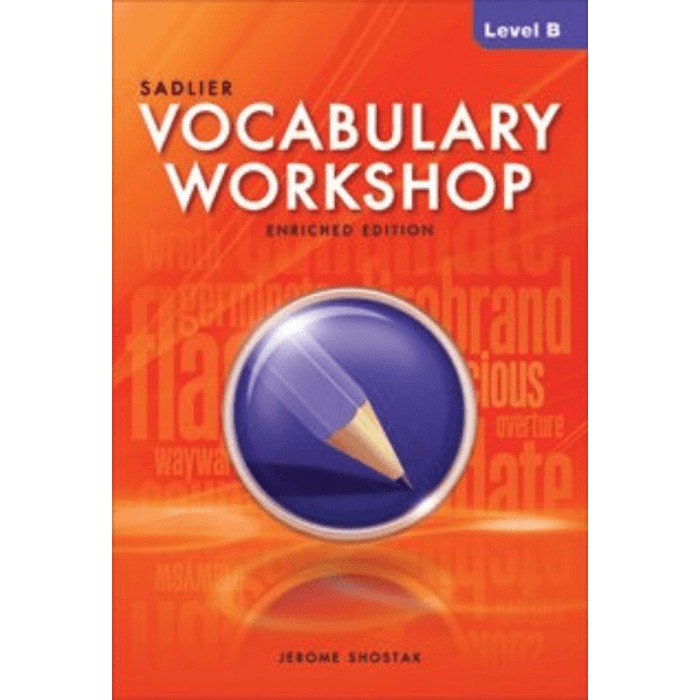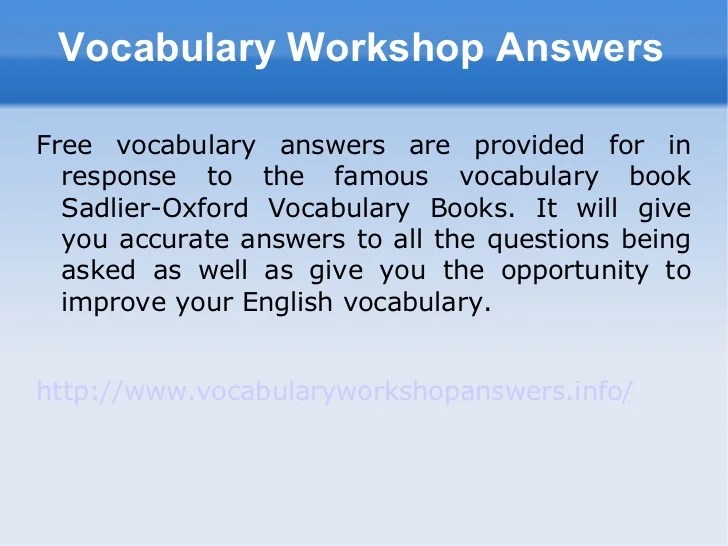Answers for Vocabulary Workshop Level A offers a comprehensive guide to vocabulary building, providing effective strategies, techniques, and insights to enhance communication and expand knowledge. This workshop empowers learners to unlock the intricacies of word roots, etymology, contextual clues, analogies, and synonyms, equipping them with the tools to navigate the vast landscape of language.
Through a journey of discovery, this workshop unveils the secrets of word origins, revealing how understanding roots and etymology can illuminate unfamiliar words and deepen comprehension. It explores the art of using contextual clues to decipher meaning, harnessing the power of synonyms and analogies to convey subtle nuances, and mastering assessment techniques to track progress and identify areas for growth.
Vocabulary Building Techniques

Vocabulary building is essential for effective communication. It allows individuals to express themselves clearly, comprehend complex texts, and engage in meaningful conversations. There are various strategies for improving vocabulary, including reading widely, using flashcards, and playing word games. Reading exposes individuals to a diverse range of words and their usage.
Flashcards help reinforce memory, while word games provide a fun and engaging way to learn new words. Additionally, techniques such as spaced repetition and active recall can enhance word retention and incorporation into daily language.
Word Roots and Etymology
Understanding word roots and etymology plays a crucial role in expanding vocabulary. Word roots are the basic building blocks of words, and they often provide clues to the meaning of unfamiliar words. For example, the root “chron” means “time,” and it appears in words such as “chronology” and “chronometer.”
By understanding word origins, individuals can decode unfamiliar words and enhance their comprehension. Additionally, etymology can provide insights into the historical and cultural contexts of words, making them more meaningful and memorable.
Contextual Clues and Inference
Contextual clues are essential for determining word meaning in unfamiliar contexts. They include synonyms, antonyms, definitions, and examples that surround the unknown word. By analyzing the surrounding text, individuals can infer the meaning of unfamiliar words. For example, if a sentence states that something is “palpable,” the reader can infer that it is tangible or can be felt.
Analogies and Synonyms, Answers for vocabulary workshop level a
Analogies and synonyms are valuable tools for expanding vocabulary. Analogies compare two relationships, helping individuals understand word relationships and clarify meanings. For example, the analogy “book is to read as car is to drive” illustrates the relationship between an object and its associated action.
Synonyms, on the other hand, provide different words with similar meanings. Using synonyms can enhance writing and speaking by conveying different shades of meaning and avoiding repetition.
Vocabulary Assessment
Assessing vocabulary knowledge is crucial for tracking progress and identifying areas for improvement. Various methods can be used, such as standardized tests, cloze tests, and vocabulary lists. Standardized tests provide a comprehensive evaluation of vocabulary skills, while cloze tests measure the ability to fill in missing words in a text.
Vocabulary lists allow individuals to self-assess their knowledge and identify words they need to learn.
Question & Answer Hub: Answers For Vocabulary Workshop Level A
What is the significance of vocabulary building?
Vocabulary building is crucial for effective communication, allowing individuals to express themselves clearly and precisely, comprehend complex ideas, and engage in meaningful conversations.
How can I improve my vocabulary?
Effective vocabulary building involves reading widely, using flashcards, playing word games, and incorporating new words into daily language through practice.
What is the role of contextual clues in determining word meaning?
Contextual clues provide valuable hints within a text that can help readers infer the meaning of unfamiliar words, such as synonyms, antonyms, definitions, and examples.
